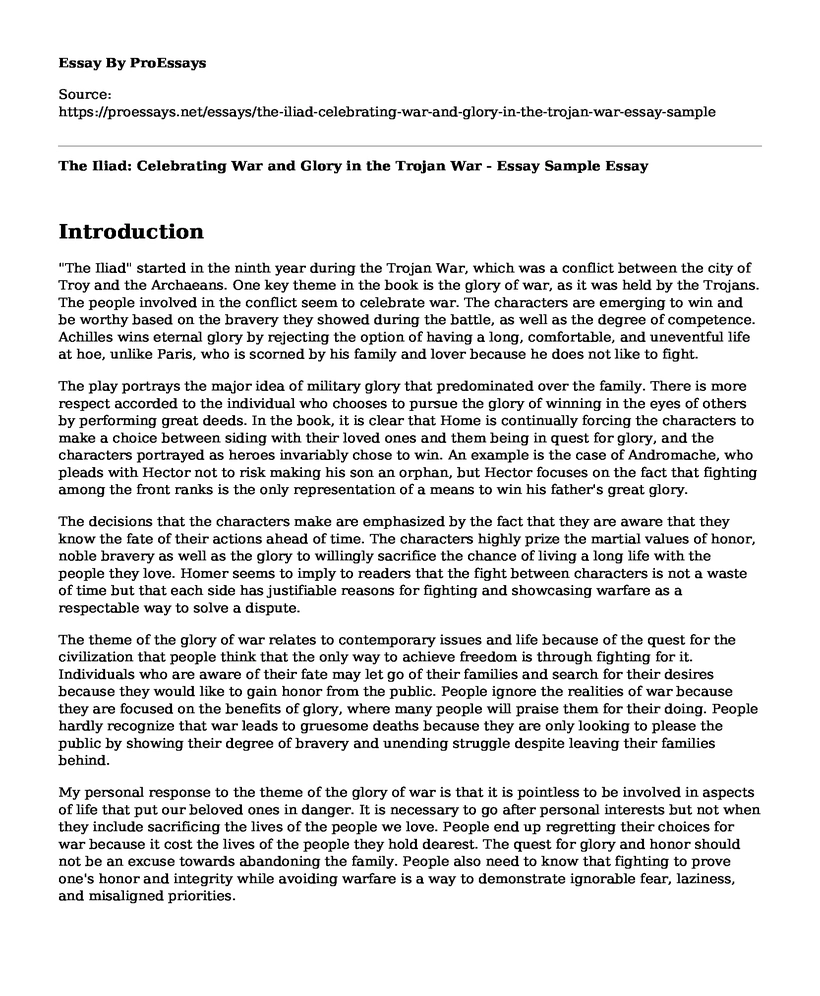Introduction
"The Iliad" started in the ninth year during the Trojan War, which was a conflict between the city of Troy and the Archaeans. One key theme in the book is the glory of war, as it was held by the Trojans. The people involved in the conflict seem to celebrate war. The characters are emerging to win and be worthy based on the bravery they showed during the battle, as well as the degree of competence. Achilles wins eternal glory by rejecting the option of having a long, comfortable, and uneventful life at hoe, unlike Paris, who is scorned by his family and lover because he does not like to fight.
The play portrays the major idea of military glory that predominated over the family. There is more respect accorded to the individual who chooses to pursue the glory of winning in the eyes of others by performing great deeds. In the book, it is clear that Home is continually forcing the characters to make a choice between siding with their loved ones and them being in quest for glory, and the characters portrayed as heroes invariably chose to win. An example is the case of Andromache, who pleads with Hector not to risk making his son an orphan, but Hector focuses on the fact that fighting among the front ranks is the only representation of a means to win his father's great glory.
The decisions that the characters make are emphasized by the fact that they are aware that they know the fate of their actions ahead of time. The characters highly prize the martial values of honor, noble bravery as well as the glory to willingly sacrifice the chance of living a long life with the people they love. Homer seems to imply to readers that the fight between characters is not a waste of time but that each side has justifiable reasons for fighting and showcasing warfare as a respectable way to solve a dispute.
The theme of the glory of war relates to contemporary issues and life because of the quest for the civilization that people think that the only way to achieve freedom is through fighting for it. Individuals who are aware of their fate may let go of their families and search for their desires because they would like to gain honor from the public. People ignore the realities of war because they are focused on the benefits of glory, where many people will praise them for their doing. People hardly recognize that war leads to gruesome deaths because they are only looking to please the public by showing their degree of bravery and unending struggle despite leaving their families behind.
My personal response to the theme of the glory of war is that it is pointless to be involved in aspects of life that put our beloved ones in danger. It is necessary to go after personal interests but not when they include sacrificing the lives of the people we love. People end up regretting their choices for war because it cost the lives of the people they hold dearest. The quest for glory and honor should not be an excuse towards abandoning the family. People also need to know that fighting to prove one's honor and integrity while avoiding warfare is a way to demonstrate ignorable fear, laziness, and misaligned priorities.
Cite this page
The Iliad: Celebrating War and Glory in the Trojan War - Essay Sample. (2023, Jul 06). Retrieved from https://proessays.net/essays/the-iliad-celebrating-war-and-glory-in-the-trojan-war-essay-sample
If you are the original author of this essay and no longer wish to have it published on the ProEssays website, please click below to request its removal:
- Iago Is Not Entirely to Blame for the Othello Tragedy - Controversial Essay
- The Discord in the Imagery of Health and Death in Hamlet Essay
- Willy from The Death of A Salesman: Character Analysis Essay
- Love's Power: Romeo and Juliet Essay
- Literacy Instructional Plan Paper Example
- Essay Sample on A Clean, Well-Lighted Place: Hemingway's Autobiographical Criticism
- Paper Example on True Love: Exploring Shakespeare's Iconic Sonnet 116







